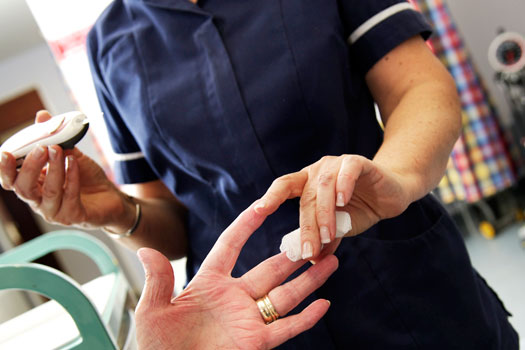NHS England has launched a specific support service for diabetes patients during the Covid-19 pandemic, after research by the National Diabetes Audit linked the condition with much higher death rates from the virus.
The dedicated analysis, which follows last week’s statistic that 26% of all people who have died with coronavirus in England had a diabetes diagnosis, has provided further evidence that diabetes – particularly if uncontrolled – worsens outcomes of Covid-19.
A diabetes telephone helpline and an online tool will assist people who need help with controlling their blood glucose levels, NHS England said, set up in cooperation with Diabetes UK, Novo Nordisk and Insule.
It comes as the new analysis, which accessed more detailed patient data, showed that:
- A third of Covid-19 deaths in hospitals in England between 1 March and 11 May were associated with diabetes (7,466 with type 2 diabetes and 365 with type 1, out of a total 23,804 deaths).
- Patients with type 1 diabetes have a 3.5 times greater risk of dying with Covid-19 than people without diabetes.
- Patients with type 2 diabetes have double the risk of death compared with people without diabetes.
- Particular risk factors were higher blood glucose levels, as well as obesity; older age, being male; of BAME origin; and living in more deprived communities.
- Pre-existing kidney disease, heart failure and previous stroke also added to the risk of death for patients with type 1 and type 2 diabetes.
Professor Partha Kar, national speciality advisor for diabetes at NHS England, said: ‘It is clear that people with diabetes are more at risk of dying from Covid-19 and more detailed analysis is currently underway to understand the link between the two, although initial findings indicate that the threat in people under 40 continues to be very low.
‘The NHS has put extra measures in place so that people living with diabetes can manage their condition better during the pandemic, including a range of online services, video consultations with your local clinical team and a dedicated helpline for those who need advice.’
However, despite the increased risk, the chief medical officers’ advice across the UK remains that diabetes patients are in the ‘moderately’ vulnerable, rather than the ‘extremely’ vulnerable risk group, and are therefore not automatically on the list of patients who require shielding.
A Department of Health and Social Care (DHSC) spokesperson told Pulse: ‘The guidance on shielding and protecting people who are clinically extremely vulnerable from Covid-19 has been developed by expert doctors.
‘They have identified specific medical conditions that, based on what we know about the virus so far, place someone at greatest risk of severe illness from Covid-19. We continue to keep this evidence under review.’
The DHSC explained that the high proportion of people who have died who had diabetes does not by itself indicate that the condition is a significant enough risk factor for severe illness from Covid-19 for shielding to be advisable.
But they stressed that, already being on the clinically vulnerable list, patients with diabetes should be strictly following social distancing measures.
In March, diabetes patients were advised to only leave their home when absolutely necessary, whilst those on the ‘extremely’ vulnerable list have been advised not to leave their house at all.

















